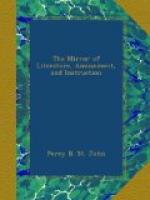[1] How pleasingly is the
substance of these observations embodied
in
one of our “Snatches from Eugene Aram:”—“It
has been
observed,
and there is a world of homely, ay, of legislative
wisdom
in the observation, that wherever you see a flower
in a
cottage
garden, or a bird at the window, you may feel sure
that
the
cottagers are better and wiser than their neighbours.”
Vol. i.
p.
4. Yet with what wretched taste is this morality
sought to be
perverted
in an abusive notice of Mr. Bulwer’s Eugene
Aram, in
a
Magazine of the past month, by a reference to Clark
and Aram’s
stealing
flower-roots from gentlemen’s gardens to add
to the
ornaments
of their own. The writer might as well have said
that
Clark
and Aram were fair specimens of the whole human race,
or
that
every gay flower in a cottage garden has been so stolen.
The Manchester Garden, we should think, must, by this time, have an Eden-like appearance. The Committee began fortunately. Mr. Loudon, in one of his valuable Gardening Tours,[2] refers to “a few traits of liberality in the parties connected with it; the noble result, as we think, of the influence of commercial prosperity in liberalizing the mind. Mr. Trafford, the owner of the ground, offered it for whatever price the Committee chose to give for it. The Committee took it at its value to a common farmer, and obtained a lease of the 16 acres (10 Lancashire) for 99 years, renewable for ever at 120l a year.” He describes the donations of trees, plants, and books, by surrounding gentlemen, as very liberal. Mr. Loudon does not altogether approve of the plan, and certainly by no means of the manner in which the Garden has been planted, yet he has no doubt it will contribute materially to the spread of improved varieties of culinary vegetables and fruits, and to the education of a superior description of gardeners. He commends the hothouses, which have been executed at Birmingham; especially “the manner in which Mr. Jones has heated the houses by hot water; though a number of the garden committee were at first very much against this mode of heating. Mr. Mowbray (who planned the Garden) informed us that last winter the man could make up the fires for the night at five o’clock, without needing to look at them again till the following morning at eight or nine. The houses were always kept as hot as could be wished, and might have been kept at 100 deg. if thought necessary. A young gardener, who had been accustomed to sit up half the night during winter, to keep up the fires to the smoke flues (elsewhere) was overcome with delight when he came here, and found how easy the task of foreman of the houses was likely to prove to him, as far as concerned the fires and nightwork.”




